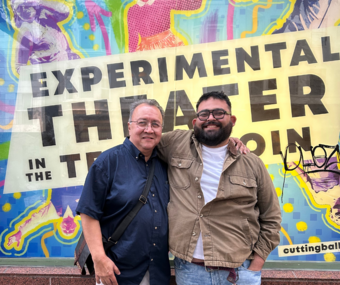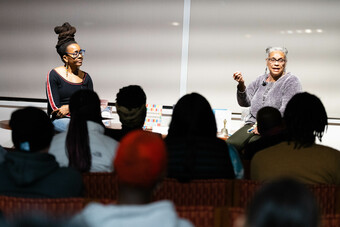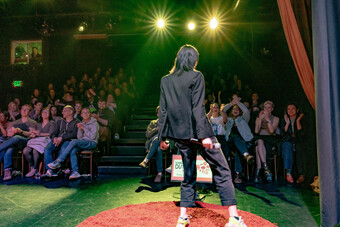Interview with Marc Bamuthi Joseph
Somewhere in Tree City, in between the enclave over the hill and the block where the community center is, in between conversations with Van Jones at the University of Chicago and the number 54 bus in Oakland, I catch up with one of the illest young playwrights, directors, and curators on the planet, my homeboy Marc Bamuthi Joseph (via electric tin can on string). After exchanging customary what’s ups and peaces, I ask him three questions. Dig the beauty in the answers and the light in the bop.
Denizen Kane: There’s an element of magic realism in your work—settings and time bleed into each other and personality, myth and history blend. But both the magic and reality are located in the human body. This is incredibly compelling to me, as it suggests a faith in the capability and potential for the human person that is transcendent. What is the basis of your faith?
Marc Bamuthi Joseph: I often talk about using my body in order to leave it. The transcendent has always been present in my work through the medium of dance. The notion of the ecstatic is important to me, given that my compositions are conditioned to re-act the reality that the body is a temporary vessel and that at death, my energy will return to the universe that birthed it. It is scientific as it is spiritual. Newton knows. All energy is a medium—will you be a medium for enmity or light? And I also believe that these things exist in a continuum. I push for craft that engages this temporality as a physical reality. In work like Tree City Legends or Red, Black and Green: A Blues, you are in proximity to this reality—there is a tactile transposition of this reality going on. It’s part of the physics of the play. There is not so much distance between these physics and my faith. What did Saint Paul say? “Make me a channel for your peace.” A carpenter makes things to fulfill a certain structure and function. Artists use content to create work that functions a certain way. I shape my work to affirm performance as a ritual space.
DK: Your work is literature, but there are extra-lingual moments—movement and ritual—as well as musical moments. In Red, Black, and Green: A Blues, you sing—I felt—because there are certain laments that can’t be spoken. What compelled you to mourn in song?
MBJ: My collaborators are incredibly soulful people. Tommy Shepherd, Theaster Gates, and Traci Tolmaire. Melody was a part of the vernacular of the piece, even more so than in my previous pieces, where melody was still vital, but more of a bridge or scaffold. In this work we were dealing with the geography of the African American experience. We sang, rapped, made beats with repurposed material and repurposed the sounds of that experience. The piece is read best given a literacy of hip hop, gospel, and soul traditions. [The crew is] so very well versed musically.
DK: When you began directing Tree City, you insisted that it was universal, which I found incredibly affirming. You asked us what we leave behind and what we pass on. I’d like to ask that of you today. What are you leaving behind? What are you passing on?
Every day is letting go. Every day there is a release of stored energy and presuppositions about the world and myself. Letting go is survival.
MBJ: Hopefully something good. Every day is letting go. Every day there is a release of stored energy and presuppositions about the world and myself. Letting go is survival. Like my baba says, “It’s a lot easier to travel if you put your baggage down.” There’s a certain foolishness in believing we’re in control of everything. We create fictional realities based on fact and then let go in service of something—a play, or larger narrative. There’s always the letting go of that which is not in service. As far as letting go and passing things on go, there’s Youth Speaks, this generation of young artists that we’re involved in, letting go of past monikers, past prisons of want, the nomenclature of form… I’m interested in dismantling form, dismantling the canon and repurposing it, in affirming the legitimacy of multiple streams of literacy and canon. Soyinka, Biko, and Fanon are as much canon as Freud, Dostoevsky, and Hemingway. So are KRS-One, Rakim, and Denizen Kane. Growing up, I read Ntozake Shange, James Baldwin, and Toni Morrison, but I didn’t want to be them. I wanted to be Big Daddy Kane. That’s the kind of writer I want to be. One that employs the jazz and play in literature that our elders disavowed. I am a vessel and ambassador for hip hop intellect in literature and composition of body.
DK: Word. And with that, tin cans on strings sever lines for the time being. Pick it up again when you hear the metal ring. Peace.
Denizen Kane is a poet and musician born and raised in Tree City. He is one of the founders of I Was Born With Two Tongues (1998-2003), an Asian American spoken word quartet that played a major role in the current spoken word resurgence. The group toured extensively, independently released an LP, Broken Speak, and helped create an open forum for issues of race, identity, and immigration to be discussed throughout a network of colleges, community groups, and local crews. His poetry has been published in numerous periodicals and anthologies, including the Asian Pacific American Journal, the Columbia Review, Echoes upon Echoes: New Korean American Writings, and Screaming Monkeys. He has also performed on three seasons of Russell Simmons Presents Def Poetry Jam. In 2000, Denizen co-founded Typical Cats, a Chicago-based hip hop collective. They have released two LPs through indie imprint Galapagos4: a self-titled debut (2000) and Civil Service (2004), generating an enormous word-of-mouth buzz on the strengths of their stellar live show and stunning on-wax chemistry. Kane made his mark as a solo artist in 2002, with an EP entitled Tree City Legends. His newest LP, Tree City Legends, Volume 2, furthers his reputation as a precocious lyricist, style innovator, and great storyteller-in-the-making. Kane has toured from New York to Tokyo to Los Angeles, and performed with such underground luminaries as the Visionaries, Living Legends, and J-Live. He continues to create, experiment, build, and break away. Tree City Legends Never Die.













Comments
The article is just the start of the conversation—we want to know what you think about this subject, too! HowlRound is a space for knowledge-sharing, and we welcome spirited, thoughtful, and on-topic dialogue. Find our full comments policy here
Denizen Kane,
I just discovered your music tonight on YouTube and I am a fan. We are coming from different ends of the spectrum but I feel a tight connection to your music. I currently live in Alameda, Ca. I would very much like to correspond about music sometime.
Keep up the good work.
Brian J. Kenny
perfect interview on both sides.